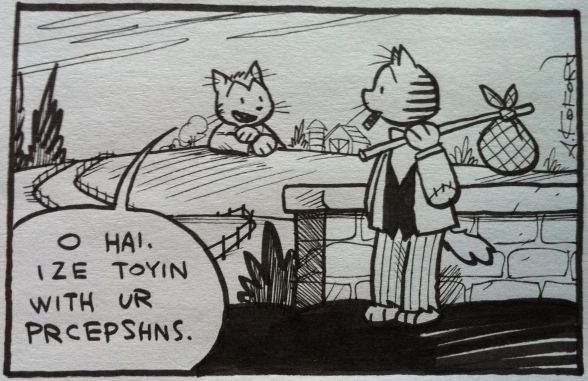The Peripheral, Gibson. Yes. It’s refreshing to see Gibson returning to Prophet-of-Cyberspace mode from Tom Clancy mode. The epigraph is from Wells’s Time Machine, and Gibson’s take on the topic is as clean as they come.
Author Archives: Craig
Years of Rice and Salt Review
The Years of Rice and Salt, Robinson. Yes. This was a book club recommendation, based on the presence of similar themes to a movie I saw a little while ago. In addition to those resonances, parts of it also evoked Hofstadter, specifically I Am a Strange Loop. Writing was quite good, though somewhat variable (a certain amount of which might be expected in such a lengthy work).
City & the City Review
The City & the City, Miéville. Yes. This was my first ebook (from the library), which may have affected my experience somewhat, though not that I was able to detect. To get the editing complaints out of the way, there was a bad “whomever” that probably would have been on the first page of the paper volume. Later, there was a bad “whoever”, which doesn’t quite make up for it, and a “these kind”, which I believe I’ve never encountered before in an edited work. Finally, there were a number of places where hyphens were used where em dashes would have been appropriate, including at least one instance of an appositive set off by an em dash at the beginning and a hyphen at the end.
The story itself was adequately intriguing, with an unusual hook. Miéville drew out the explication of that hook just a little bit longer than was strictly called for, but it was not disqualifyingly long.
Hydrogen Sonata Review
The Hydrogen Sonata, Banks. Yes. Banks’s Culture novels have reached the same “reliable and plentiful” status that Pratchett’s Discworld novels have for me. I am looking forward to getting to some of the installments that have been specifically recommended on merit, rather than having been a good introduction or the latest release.
In Conquest Born Review
In Conquest Born, Friedman. Yes. A book club recommendation, this first novel is somewhat longer than it needs to be, but the space opera struck me as worth the time. I was reminded of the Zelazny story “The Furies” by the sympathetic portrayal of (what might be expected to be) unsympathetic characters, though there was less unsympathetic portrayal of the sympathetic characters.
Cuckoo’s Egg Review
Cuckoo’s Egg, Cherryh. Yes. I don’t know why I had chosen never to read Cherryh over the years, but this came up as a book club selection, and I rather enjoyed it. I am a sucker for books that keep me wondering what the hell is going on without cheating, and this one executed that quite nicely. More Cherryh will very likely be coming up in book club.
Dead Mann Running Review
Dead Mann Running, Petrucha. Yes. Sequel to Dead Mann Walking (will Flying be next?). Petrucha’s world continues to entertain me. I will be interested to see how sustainable the various premises will be, assuming Petrucha continues to write in this world. I would like to be optimistic, despite some reservations. On the other hand, maybe it is planned to be closed-ended.
Player of Games Review
The Player of Games, Banks. Yes. Not the fastest-moving, and there is a particular plot point that annoyed me at the time and that I’m still not sure I get the point of, but overall a fine book.
Mercury Review
Mercury: An Intimate Biography of Freddie Mercury, Jones. Non-fiction. This seemed at least as much a survey of other writings as an intimate biography, though Jones does eventually get down to a substantial amount of original reporting. I was pleased that there is less tittle-tattle than I feared there might be; with the subject’s prodigious appetites, though, it would be unrealistic to expect any biography not to touch on his various excesses (and disingenuous of a biographer to pretend they did not exist). Given its survey nature, there is quite a bit of “Person A described events this way, but Person B disagreed.” While that was somewhat unsatisfying, I think on reflection I need to give Jones credit for not cherry-picking stories to fit a chosen narrative. After all, people are complicated, and eyewitness testimony is notoriously unreliable. Still, I can’t recommend it for any but the most dedicated fans.
Death at La Fenice Review
Death at La Fenice: A Commissario Guido Brunetti Mystery, Leon. Yes. I was reasonably sure I was going to like this when I reached this part, fairly early:
It seemed, in this moment, that he had spent his entire life … telling someone that someone they loved was dead or, worse, had been killed. His brother, Sergio, was an X-ray technician and had to wear a small metallic card pinned to his lapel that would turn a strange color if it was exposed to dangerous amounts of radiation. Had he worn a similar device, sensitive to grief or pain or death, it would have changed color permanently long ago.
It was something of a mixed bag, with delightful passages interspersed with sentences that pulled me out of the story to puzzle out what was wrong—or at least distracting—about them. It was also somewhat the opposite of hard-boiled, with passages such as this one:
… shock of silver hair swept back from his angular face. There was the faint Slavic tilt to the eyes, which appeared curiously light under the dark brows that overshadowed them. The nose was entirely too long for the face, but the effect of those eyes was so strong that the slight defect hardly seemed worth notice. The mouth was broad, the lips full and fleshy, a strangely sensual contrast with the austerity of the eyes.
Overwhelmingly positive, on balance, though I think Leon will probably be on my “reliable standby” list with Pratchett, rather than the “must read” list with Tana French.
